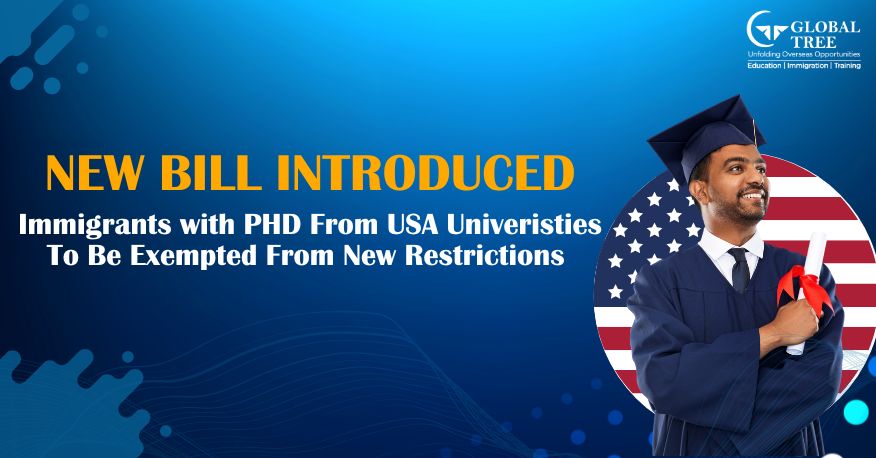New Bill Introduced - Immigrants with PHD from US Universities to be exempted from New Restrictions

H1b Visa USA
A new H1b visa bill was introduced in the United States House of Representatives, which seeks to exempt individuals filing H1b applications who hold a Ph.D. from an American University from the new additions to the H1b visa requirements and the restrictions they place on people seeking an H1b visa sponsorship. The Bill, dubbed as the STAPLE Act, which is an acronym for Stopping Trained in America PhDs from Leaving the Economy (STAPLE) Act, is expected to benefit a number of Indian students who have completed their Ph.D. in the USA and are now in the process of filing their H1b application. The H1b visa was introduced in 1989 in order to address the shortage of skilled labor in USA. H1b visa is a visa program that allows a limited number of skilled workers from other countries to be employed by companies in USA. The validity period for the visa is three years, and can be subsequently extended to six years.
The H1b is an employer sponsored visa, which means a person entering USA under the visa cannot apply on his own. His employer must apply on his behalf with the United States Citizenship and Immigration Services (USCIS). The visa provides 65,000 visas each year to skilled foreign workers. As the number of individuals filing their H1b application are far higher than the number of visas being issued, the authority overseeing the H1b visa process has until now used a lottery system decide on who should be awarded the H1b visa. The H1b visa is an employment based visa and H1b visa sponsorship by an employee is mandatory.
The lottery system of issuing visas had led to mounting criticism of the H1b visa process with many arguing that the H1b visa sponsorship is being misused by companies as a route to hire cheap labor from abroad.Back in March 2015, there was a bevy of executive orders signed by President Trump, and visa bills introduced in the senate to reduce the acceptance rate of H1b applications and place restricting clauses on employees hiring foreign talent through the H1b visa sponsorship route. The bills named as H1b Visa Reform Act of 2017 and Protection of Americans Jobs Act.
[Read More: US Immigration Premium Processing To Resume For H1b Visa]
H1b Visa Reform Act of 2017 and Protection of Americans Jobs Act
Sought to bring the following changes to the H1b visa process
- The maximum authorized duration for which an H1b visa holder can stay in USA would be reduced from six years to two years.
- The authority and scope of the Department of labor with respect to the H1b visa process would be increased, enabling the department to put in place additional checks on H1b applications wherever deemed necessary.
- The bill would prohibit employers from hiring L1 workers for more than a year.
- The bill would make a degree from the US or foreign university for applicants who are applying for the special skill status.
- An employer, hiring talent under the H1b visa sponsorship program, would be prohibited from laying off a US worker 90 days before or after filing of a visa application for an employee hired for the same position
- Additional scrutiny and restrictions would be placed on H1b applications including doubling of a minimum wage that needs to be paid for workers being hired through H1b visa sponsorship and removing certain job categories from the list of skilled jobs class.
The reforms proposed in these bills clearly tilt the balance towards reducing the number of H1b visas being issued. Although a wise move on the surface, it would lead to a number of highly skilled people who have earned a degree from a US university, leaving the USA, and using their newly acquired skills to benefit other countries. Realizing the futility of turning away thousands of highly educated individuals who file H1b applications to stay on in America, the STAPLE Act, a bipartisan bill was introduced in the US House of Representatives by Republican Erik Paulsen and Democrat Mike Quigley. The pair sought to nullify the new proposed restrictions on h1b applications on students who acquire a Ph.D. from a US university and exempt them from the increased restrictions. The pair opined that the USA needs to make sure that students trained in the country, should be allowed to stay on and encouraged to use their knowledge to contribute to the American economy. Although all the bills discussed above, are yet to be passed into law, the tabling of these bills indicates that a healthy debate is going on in America regarding the efficacy of the H1b visa process.
[Read More: USCIS announces new H1B Cap season]
Which side will prevail? Only time will tell. In the meanwhile, if you want to know more about the H1b visa process get in touch with Global Tree the Most Trusted Immigration Consultant in India.



 964 260 9000
964 260 9000